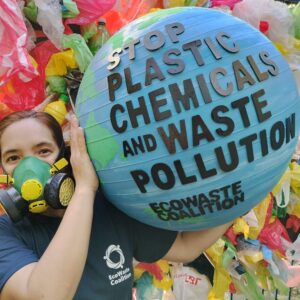MANILA, Philippines — Environmental and health groups are pushing for initiatives to ensure that chemicals are “produced, used and managed” to prevent harmful impacts on human health, nature, and climate as the Philippines joins the rest of the world in celebrating Earth Month.
On Earth Day last Saturday, the EcoWaste Coalition, Interfacing Development Interventions for Sustainability (IDIS), Taiwan Watch Institute (TWI), Wonjin Institute for Occupational and Environmental Health (WIOEH), and the International Pollutants Elimination Network – Southeast and East Asia (IPEN-SEA) shared ideas on reforming chemical industry amid the current global chemical and plastic pollution crisis, which contributes to the worsening effects of climate change.
“The petrochemical sector is a key blind spot in the climate crisis, yet it will drive half the oil demand between now and 2050. Much of this will go into a doubling of plastic production in the next 20 years,” said Beverley Thorpe from the Clean Production Action in a statement.
Thorpe, who also authored the Safer Solutions plank of the Louisville Charter for Safer Chemicals, noted that global chemical pollution is at “code red,” meaning the “safer planetary boundary for pollutants has been exceeded.”
To combat this, Thorpe pointed out the need to cap chemical production.
“We need to decarbonize, detoxify and democratize the way chemicals are produced. Change is possible, and the Louisville Charter provides a solutions path forward. The chemical sector transformation requires sustainable chemical design based on green chemistry and engineering principles,” she said.
This transformation, she added, will bring benefits, renewable and low-hazard feedstock chemicals, community-friendly processes, and safe material re-use in a circular economy.
‘Transparency in chemical information’
For his part, WIOEH Senior Researcher Dr. Junhee Cho highlighted the importance of transparency in chemical information.
“Many people, including children, are exposed to toxic chemicals because they don’t know what’s inside the products they use,” he said, citing South Korea with over 1,000 deaths due to toxic chemical exposure in humidifier disinfectants.
Following this incident, Cho said his country demanded chemical transparency, resulting in a household product safety agreement between the South Korean government and its industries.
‘Toxic chemical-free future’
Meanwhile, Atty. Mark Peñalver, Executive Director of IDIS, stressed that much work must be done to protect human health and the environment and their rights’ advancement.
“The goal should be to build a toxic chemical-free future for the environment, for ourselves and our children, and for the generations to come,” Peñalver said.
On the other hand, Mother Earth Foundation chairman Sonia Mendoza welcomed the 10 policies of the Louisville Charter, which provides for “the principles and practices towards a reformed chemical sector, as well as the proposed global green fund addressing chemical and waste pollution.”
The Louisville Charter serves as a shared roadmap for transforming the chemical industry globally so that it is no longer a source of greenhouse emissions and toxic harm.
RELATED STORIES:
EcoWaste Coalition warns consumers of cosmetics with high levels of mercury
Avoid perfumes with ‘reprotoxic’ chemicals, warns EcoWaste Coalition
gsg
